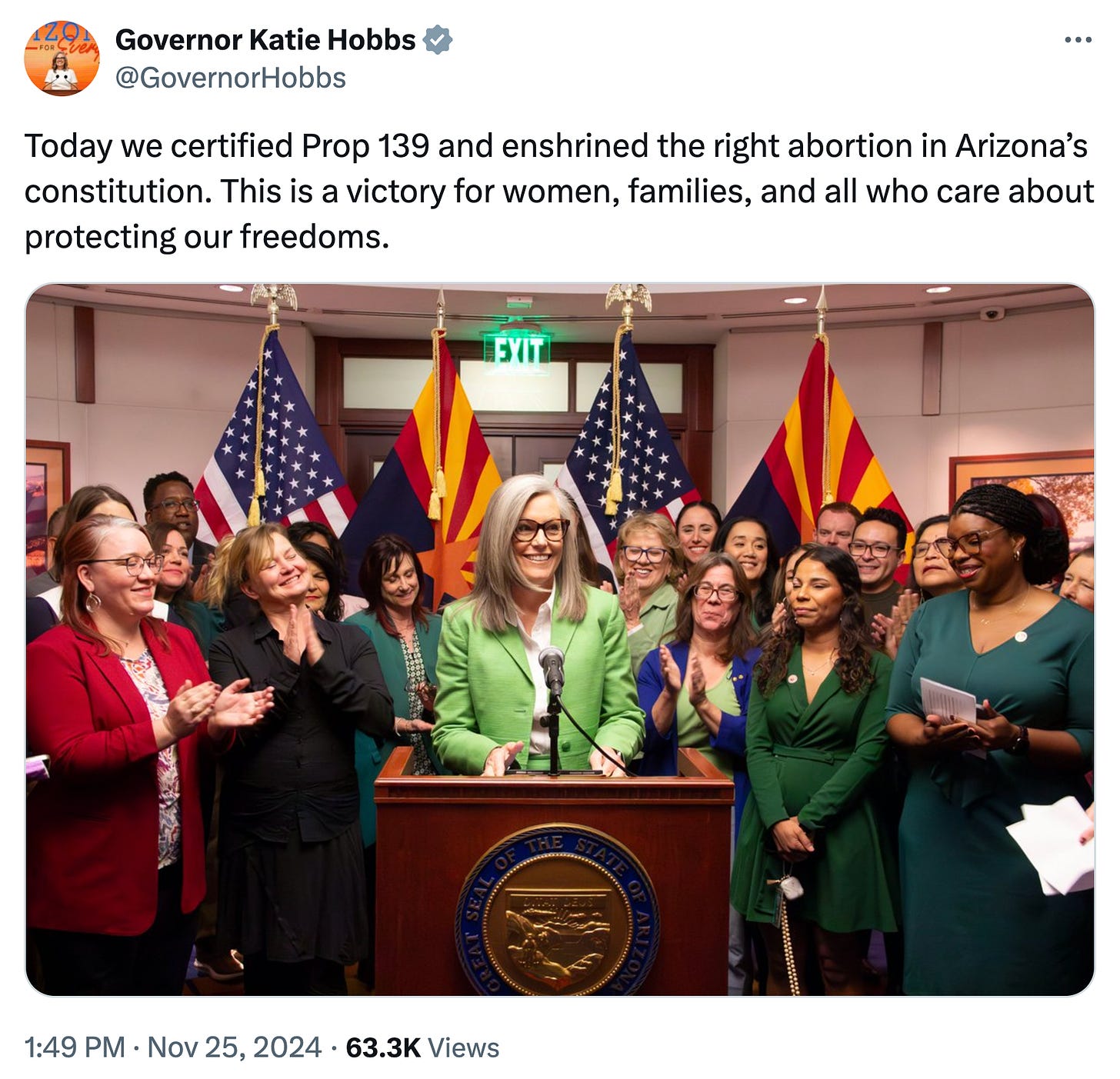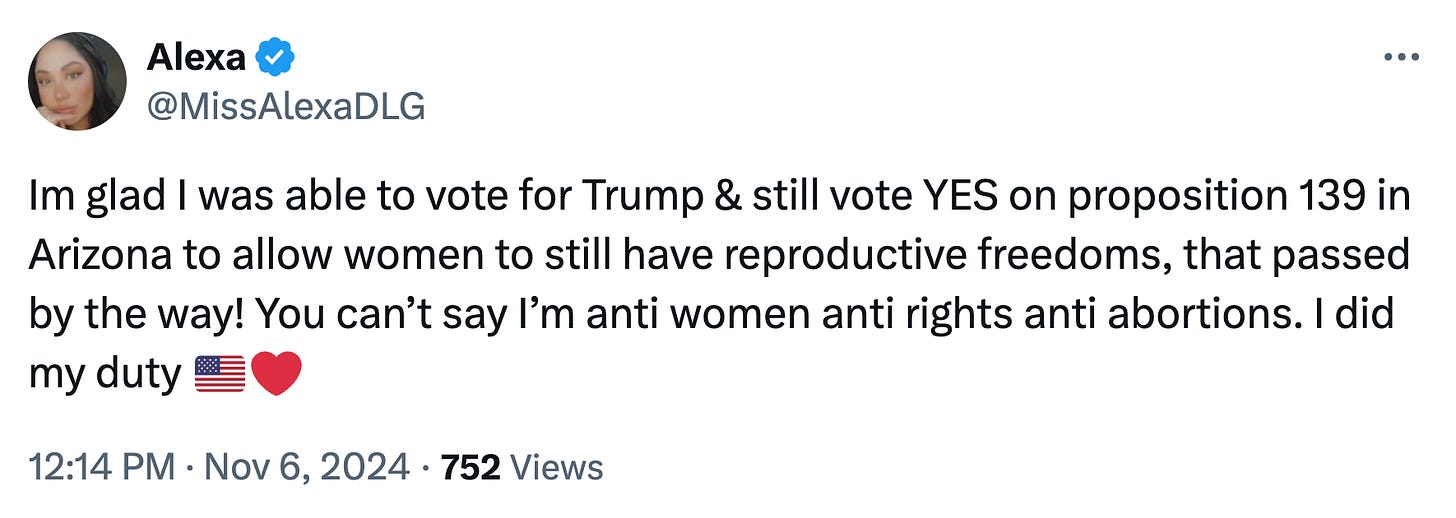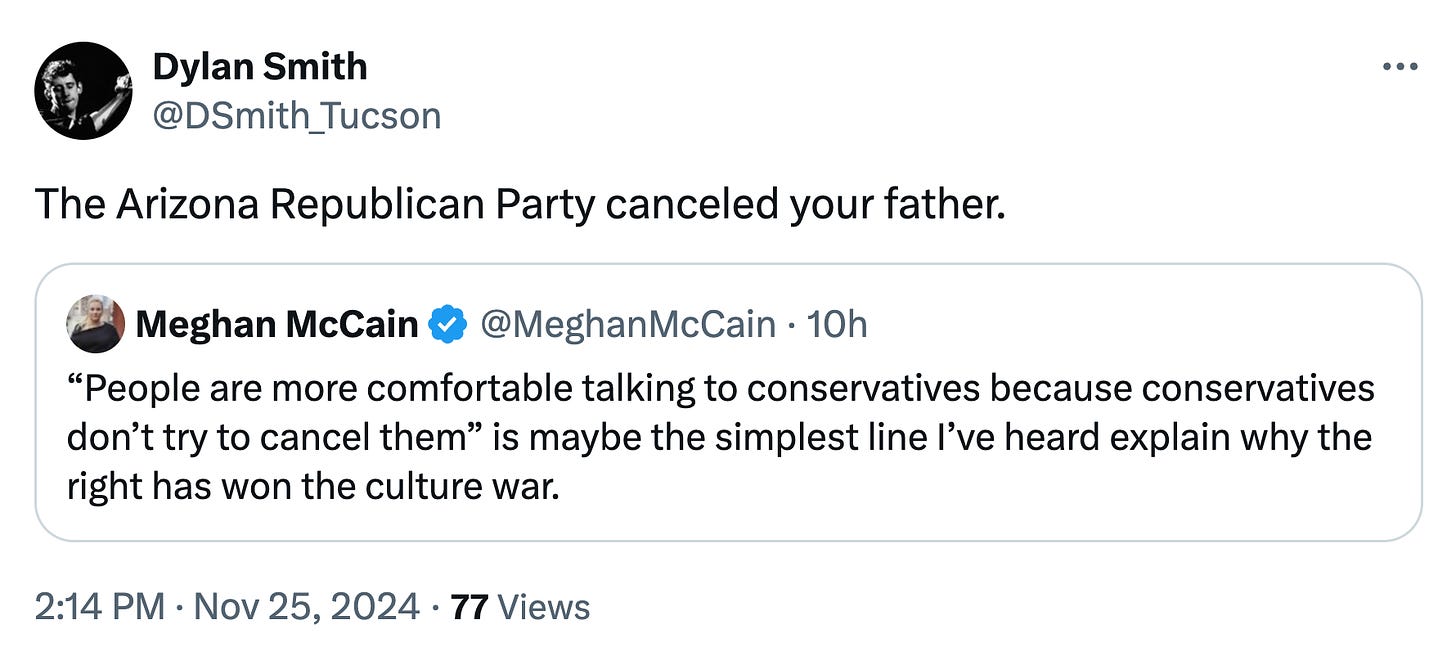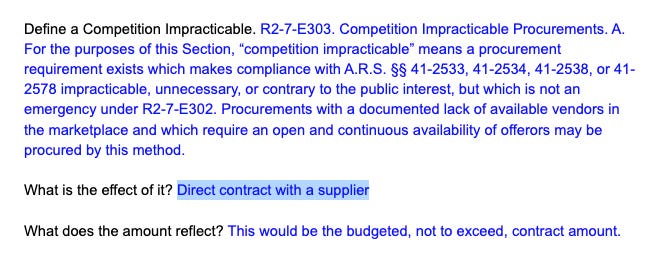Contradictions at the ballot
Democrats lose but their policies win … Election denialism is dead … And read it and weep, Tom.
Democrats are slowly reaching a point where they can reflect on what went wrong on Nov. 5, including the inability to translate support for abortion rights into votes for Democratic candidates.
As Democrats scratch their heads over why people who supported Prop. 139, a measure that enshrines the right to an abortion in the Arizona Constitution, also voted for the presidential candidate who took away that right, perhaps the seeming disconnect should not be surprising.
Just as Prop. 139 was separate from the candidate races on the ballot, voters were able to separate the issue of abortion from other issues just as or more important to them, like the economy.
“Voters are a lot more complex than what we give them credit for sometimes,” Democratic strategist DJ Quinlan told us.
Both Quinlan and Rep. Alma Hernandez said that some voters believed Trump was strong on abortion rights because he is opposed to a national ban, even though he is responsible for overturning Roe.
“I think it has a lot to do with misinformation … but people were really voting on how they perceived it was going to affect their pocketbook,” Rep. Alma Hernandez said about the divide.
Abortion was a winning issue for Democrats during the midterms, but 2022 is so two years ago.
Back then, the only way Arizona voters could protect abortion rights was by voting for Democratic candidates. And they did, destroying the projected “red wave” and electing Democrats to nearly every major statewide office.1
Democrats made incorrect assumptions about the 2024 electorate based on their surprising success during the midterms. These include: failing to distinguish between midterm and presidential election voters, misjudging the importance of issues like the border and the economy, and assuming people voting to protect abortion rights were aligned with Democrats.
“There is a distinction between voters who are voting because it’s a progressive idea, and voters who are voting because it is the right idea and it’s popular,” Democratic consultant Sam Richard told us. “It is ridiculous that we had a 15-week abortion ban and that we were two votes away from having a Civil War-era ban on abortion. But agreeing with that sentiment doesn’t make someone a Democratic voter.”
Limiting abortion is not popular amongst the electorate, but voters did not penalize the officials responsible for it.
Trump received around 52% of the vote, despite appointing Supreme Court justices who overturned Roe. Arizona Supreme Court Justice Clint Bolick retained his seat despite ruling in favor of the 1864 abortion law. Republicans gained ground in the state capitol, despite nearly all of them voting against a repeal of the 19th-century statute.
By contrast, U.S. Sen.-elect Ruben Gallego, the highest-performing Democrat statewide, won with barely over 50% of the vote.
Abortion is still a winning issue in 2024, with Prop. 139 passing with over 60% of the vote.
But the Democrats… not so much.
The most exciting thing to happen at today’s statewide canvass of the 2024 election results was a quip from Adrian Fontes, who introduced himself as the Secretary of State “for now.”
He’s rumored to be considering challenging Gov. Katie Hobbs in the 2026 primaries.
And while we were secretly hoping for someone’s phone to interrupt the canvass with a “Hail to the Chief” ringtone, Fontes, Hobbs, Attorney General Kris Mayes and Chief Justice Ann Scott Timmer inked their signatures on the official certification of 2024’s election results without disruption.
“The age of election denialism is, for all intents and purposes, dead,” Fontes announced.
But Mayes, who hasn’t held her office without now U.S. Representative-elect Abe Hamadeh insisting he rightfully won it, said election denialism is still alive and well, and “we are all aiming toward a return to normalcy … but I'm not convinced that we're there yet.”
Ribbit: The House and Senate “hoppers”2 are officially open, meaning lawmakers can officially file their bills for the 2025 session. No legislators introduced any bills as of our deadline, so we’re still hoping someone can drop the Don Bolles monument bill we’ve championed for the last two years, as HB2001 or SB1001.3
Mitchell’s mission: Maricopa County Attorney Rachel Mitchell’s plan for the next four years includes enforcing death penalties, monitoring “border crime” and the legal implications of Prop 314, and prosecuting the pro-Palestinian protesters at Arizona State University, the Republic’s Jimmy Jenkins reports. Mitchell also has an agenda she’ll ask state legislators to pass: Upping the penalties for people involved in gang-style beatings, creating a new criminal charge for Gilbert Goons-like group assaults and making it a state crime to own a device that turns a handgun into an automatic weapon.
A thirsty ask: The Arizona Water Infrastructure Finance Authority is asking companies to demonstrate methods and costs of importing more than 100 billion gallons of water amid Arizona’s precarious reliance on groundwater. But it’s also working with less than half the money the Legislature initially promised since lawmakers cut a planned $333 million deposit this year, Capitol scribe Howie Fischer writes. Meanwhile, Arizona Department of Water Resources Director Tom Buschatzke defended a newly approved plan to make developers find other water sources besides groundwater. He told KJZZ’s “The Show” the plan would replenish aquifers and protect consumers while giving developers enough time to adjust.
Time’s up: An Apache County judge dismissed the Navajo Nation Department of Justice’s lawsuit asking to give more time to 175 Navajo voters who had less than 24 hours to fix issues with their early ballot signatures, the Navajo Times reports. The judge said Apache County made reasonable efforts to help voters fix their ballots.
It’s never too late to support our work.
In local news: Glendale’s City Council is considering moving the public comment portion of its meetings to a separate forum that wouldn’t be broadcast, per 12News’ Kevin Reagan. Meanwhile, in Scottsdale, the cost of a three-part bond package voters approved in 2019 has increased by 27%, and projects like building parking structures in Old Town Scottsdale are unfunded, Scottsdale Progress’ Tom Scanlon reports.
Turns out State Superintendent Tom Horne, paragon of honesty, wasn’t honest.
After we reported that the state Department of Education awarded Office of Tourism Director Lisa Urias’ company a $250,000, five-year contract, Horne blasted out a “Demand for retraction,” insisting there was no $250,000 contract.
We’ve been waiting on an official answer from the Arizona Department of Administration, the experts in procurement, to figure out the legal effect of the document in question, which explicitly states the education department would pay Urias’ company an estimated $250,000.
Today, we got an answer.
So we’re officially demanding a retraction of Horne’s demand for a retraction.
Historically, the president’s party tends to lose seats in Congress, losing House seats in all but two midterms since World War II.
The hopper is the sorting tray where lawmakers drop bills to formally introduce them. In the House, they have one of those motion-sensor triggered frogs that croaks at you when you file a bill.
Fun fact: House and Senate bills are numbered consecutively starting with 2001 and 1001, respectively.












Demanding a “retraction of his demand for a retraction”…gotta love it 😆
Yeah, well, we'll see how those women who voted for Prop. 139 and Trump feel when his administration uses the Comstock Act to limit--perhaps even outright prohibit--the interstate transport of drugs that can be used in abortions. I wouldn't rule out Trump signing a national "Heartbeat Bill," either, although the current thin majorities in Congress make that option less likely. In short, attempts to restrict women's reproductive decisions are coming.